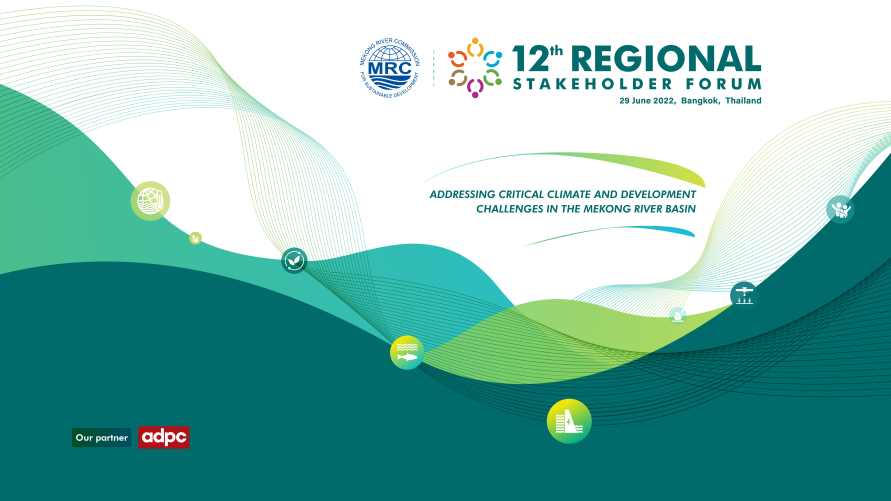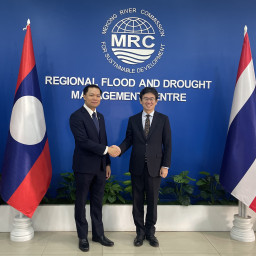The 12th MRC Regional Stakeholder Forum: Addressing Critical Climate and Development Challenges in the Mekong River Basin

FORUM OVERVIEW
The Mekong River Commission (MRC) is organizing its 12th Regional Stakeholder Forum (RSF) on 29 June 2022 in Bangkok, Thailand. The one-day event – which will be conducted in-person and broadcast live – is open to any interested stakeholder who wishes to be well informed of the latest developments within the context of the MRC’s work and cooperation.
Specifically, the 12th RSF provides a platform for the MRC to launch its already-approved Joint Study with the Lancang-Mekong Water Resources Cooperation Center (LMC Water Center), then discuss how to most effectively share information and coordinate operations of mainstream cascade dams. The forum will also seek stakeholder feedback and recommendations to enhance transboundary fisheries management as well as MRC services on flood and drought management, amid rapid development and changing climate.
As a hybrid event, the 12th RSF will be broadcast live across the MRC’s social media channels:
Facebook Twitter LinkedIn YouTube
The MRC-LMC Water Center Joint Study
In September 2021, the 25th Dialogue Partners meeting, which included the MRC as well as representatives of China and Myanmar, approved the proposed Joint Study with the LMC Water Center – following an earlier green light from the MRC Joint Committee and LMC Joint Working Group on Lancang-Mekong Water Resources Cooperation.
This Joint Study, entitled “Changing Patterns of Hydrological Conditions of the Lancang-Mekong Basin and Adaptation Strategies,” aims to assess the characteristics and fundamental causes of flood and drought. It also proposes different adaptation measures, including better information sharing and coordination of water infrastructures, for the six Mekong countries (MRC members Cambodia, Lao PDR, Thailand and Viet Nam, plus upstream neighbours China and Myanmar) to effectively address flood and drought risks, as well as the impact of low flows, in a time of changing climate.
Running until 2024, the Joint Study consists of two phases: The first is taking place during 2022 and is anticipated to yield immediate recommendations for action; the second will come during 2023–2024, implemented in coordination with the MRC Strategic Plan 2021–2025. This study is considered yet another milestone of cooperation between China and the MRC.
Sustainable Hydropower Development Strategy: Share Information and Coordinate Operation of Cascade Dams
In 2021, the MRC Council of ministers approved the updated Sustainable Hydropower Development Strategy (SHDS) for the Lower Mekong Basin. The SHDS stresses the need to move Basin development toward more optimal, sustainable outcomes, which can address long-term needs, like environmental protection and assurance of the water, food and energy nexus.
One key component in SHDS 2021 is better information sharing and potential coordination of cascade dam operation in the Basin. Due to the intensity of hydropower development along the Mekong mainstream and its tributaries – especially with potentially different owners – it’s crucial that we enhance such information sharing and project coordination. Clearly, it’s important to optimize production, but also essential for coordinating flood and drought mitigation and management; sediment transmission during flushing operations; navigation of boats and ships; and the safety of riparian communities.
National priorities for cascade operation may be linked to requirements of the electricity market; however, while the consequences of this form of operation are felt commercially, it may also have implications for the environment and community safety. This is of particular concern in the transboundary context, which needs cross-border warnings of operational events (e.g. spillway gate operations). These issues are familiar to MRC Member Countries, based on past experience in the Basin. Flood warning protocols are well established, but need to be strengthened to include dam operations and planning for related emergency responses.
Cooperation mechanisms for information sharing will play a critical role, as will clarifying the roles and responsibilities of the participating projects and Member Countries. With that in mind, the “how” and “why” are the questions we should answer.
Transboundary fisheries management
The Mekong River Basin hosts one of the most diverse freshwater faunas in the world. There are already more than 1,200 recorded fish species, though the number will increase as new species are discovered and classified. Diversity is also high among other groups of freshwater animals. The Lower Mekong River Basin inland fisheries is itself the world’s largest, with an estimated yield of 4.4 million tonnes per year, calculated at a total value of USD17 billion. More than 40 million people (two-thirds of the LMB population) are actively involved in fisheries.
However, they’re under increasing pressure, with transboundary implications. The main causes of reportedly declining catch rates, the increased capture of small or immature fish, and changes to catch composition, are believed to be the increasing and excessive fishing effort – often using illegal gear that is highly efficient – which target small or immature fish, or are deployed in fish-conservation zones or other protected areas. Fishing effort and illegal gear use have increased in response to growing demand for fish; weak knowledge and enforcement of fisheries laws; and diminishing return-on-effort for shrinking fish size and catch rates.
In the context of climate change and rapid water resource development, how can different countries and actors work together to enhance governance of transboundary fisheries? How can we encourage responsible fishing practices?
Enhancing MRC Flood and Drought Services
Countries along the Mekong continue to experience either too little or too much rain, which takes the form of recurrent drought, seasonal floods or tropical storms. According to the MRC, the average annual cost of floods in the Lower Mekong River Basin ranges from USD 60 to USD 70 million. Extreme rainfall is the primary trigger for landslides and flash floods in Southeast Asia. In recent decades, these countries have experienced severe seasonal droughts that affect food security, livelihoods and the economy. Especially, those families that rely upon river related livelihoods.
The MRC provides flood monitoring and drought-related forecasting to these LMB countries. Through partnership with the Asian Disaster Preparedness Center (ADPC) and others, this has made it possible to close gaps in many areas, such as limited rainfall data; inaccurate flood and drought forecasting information; and unreliable early warning systems. Specifically, the partnership has resulted in the development of several tools to provide improved climate information, which enables better understanding of extreme weather and supports the decision-making process – regarding riverine floods, flash floods, reservoir monitoring and drought.
It’s important to understand the dissemination and communication of climate-related information, at the regional and national level, in order to improve the overall accessibility and usability of monitoring and forecasting services.
The 12th RSF will provide participants with an opportunity to receive latest updates on Mekong water-resource development, as well as to provide recommendations on the important work in which the MRC is currently engaged.
Specifically, the forum will provide a platform for participants to:
- receive the latest information around the Mekong water-resource development activities that are part of the MRC mandate;
- recommend how to enhance the Joint Study, transboundary-fisheries management, cascade dam information sharing and coordination, and MRC flood and drought services.
We expect that by the end of the forum:
- Participants will appreciate the latest MRC updates around various development activities in the Basin and thus increase their understanding of these activities.
- Participants will recognize the need for a Basin-wide assessment of the characteristics and fundamental causes of flood and drought, and provide useful feedback of different adaptation measures, for the six Mekong countries to effectively address flood and drought risks.
- Through the feedback of participants, the MRC Secretariat will gain more insight and experiences that support and contribute to improved mechanisms for information sharing of both cascade dam operation and transboundary fisheries management.
- Better understanding of what information and data stakeholders are using – and when they’re using it – including the timing of decisions and actions, and information flows. This will also enable a clearer understanding of the relationship among different stakeholders, in the context of climate information services.
- Government officials from MRC Member Countries, including the National Mekong Committee Secretariats; implementing agencies from hydropower project development departments; and energy portfolio planning and management departments.
- The private sector, including those engaged in managing and operating hydropower projects (and/or their consultants); or who invest in hydropower dams, both on the Mekong mainstream and along its tributaries.
- Interested MRC Development Partners, representatives of civil society organizations, and research institutes.
- MRC Dialogue Partners China and Myanmar.
- Any other interested participants inside and outside the Mekong region.
Date and venue
The 12th RSF will take place in Bangkok, Thailand, at Marriott Marquis Queen’s Park Hotel. The event will be broadcast live on all MRC’s social media platforms including Facebook Twitter LinkedIn and YouTube. English will be the Forum’s medium of communication.
Marriott Marquis Queen's Park Hotel
Room: The Salathai (5th Floor)
199 Sukhumvit Soi 22, Klong Ton, Klong Toey, Bangkok, Thailand, 10110
Tel: +66 2 059 5555
Website: www.marriott.com
On Google Map: https://goo.gl/maps/HvQMZzXNviitxLag7
Registration
Participation is open to all and free of charge, but registration is required.
The online Registration is now open and will be closed on 19 June 2022.
Financial support
Limited financial support is available for participants from civil society and community-based organizations who face financial difficulty. This is to facilitate greater diversity in our meaningful dialogue. If you need this support, please indicate in the Registration Form.
Logistical note
If you're travelling from outside Thailand to join us in person in Bangkok, please refer to this Logistical Note to assist you with your travel and stay during the course of the forum.
To ensure a meaningful participation of all stakeholders, the MRC Secretariat will post all the documents below as they become available, including PowerPoint Presentations, that will be discussed at the forum.
|
Downloadable Documents |
|
|
Session 1: Opening |
|
|
Download Here Download Here Download Here |
|
Session 2: Launching Ceremony of the MRC–LMC Water Center Joint Study |
|
|
Presentation on the Joint Study and its significance |
Download Here |
|
Session 3: Launch of the Sustainable Hydropower Development Strategy (SHDS) and Its Implementation; and Transboundary Fisheries Management in the Mekong Basin |
|
|
Download Here |
|
Session 3.1: Information Sharing and Coordination of Operations of Cascade Dam: How Do We Go from Here to There? |
|
|
Panellists
|
Download Here Download here Download Here |
|
Session 3.2: Transboundary Fisheries Management in the Mekong Basin: Which future for the largest inland capture fisheries in the world? |
|
|
Download Here Download Here Download Here Download Here |
|
Session 4: Enhancing MRC Flood and Drought Services: What More Must Be Done? And How? |
|
|
Session 4.1: Plenary
|
Download Here |
|
Panellist 4.2: Country perspectives
|
Download Here Download Here Download Here Download Here |
|
Panellists 4.3: Partner and public perspectives
|
Download Here Download Here Download Here |
If you have any questions on logistics, participation and media, please let us know.
For logistics
Ms Soukouman Viravong
Administration Assistant
MRC Secretariat
E-mail: soukouman@mrcmekong.org
For participation and the media
Mr Sopheak Meas
Stakeholder Engagement Specialist
Interim Press Officer
MRC Secretariat
E-mail: sopheak@mrcmekong.org


